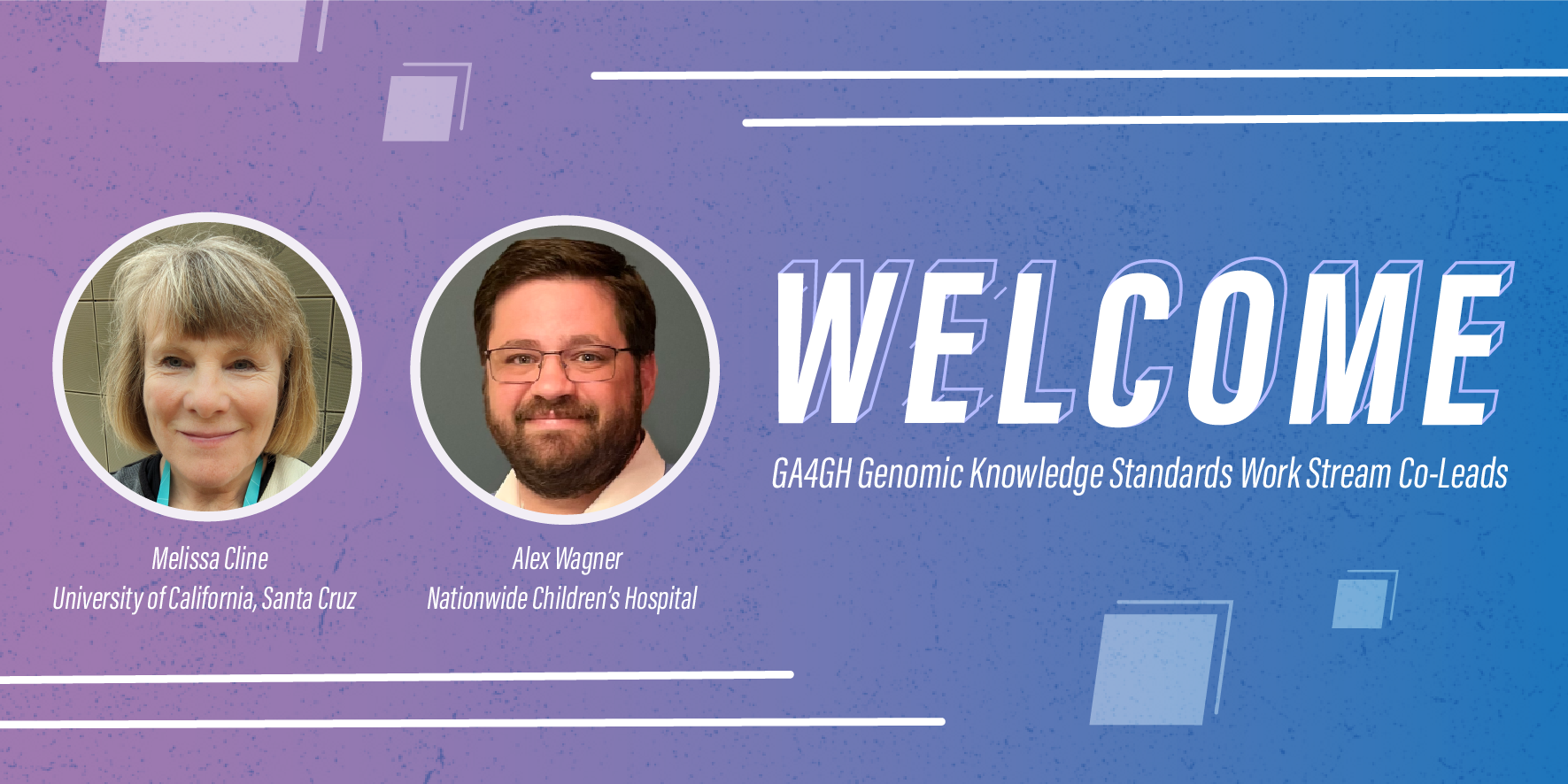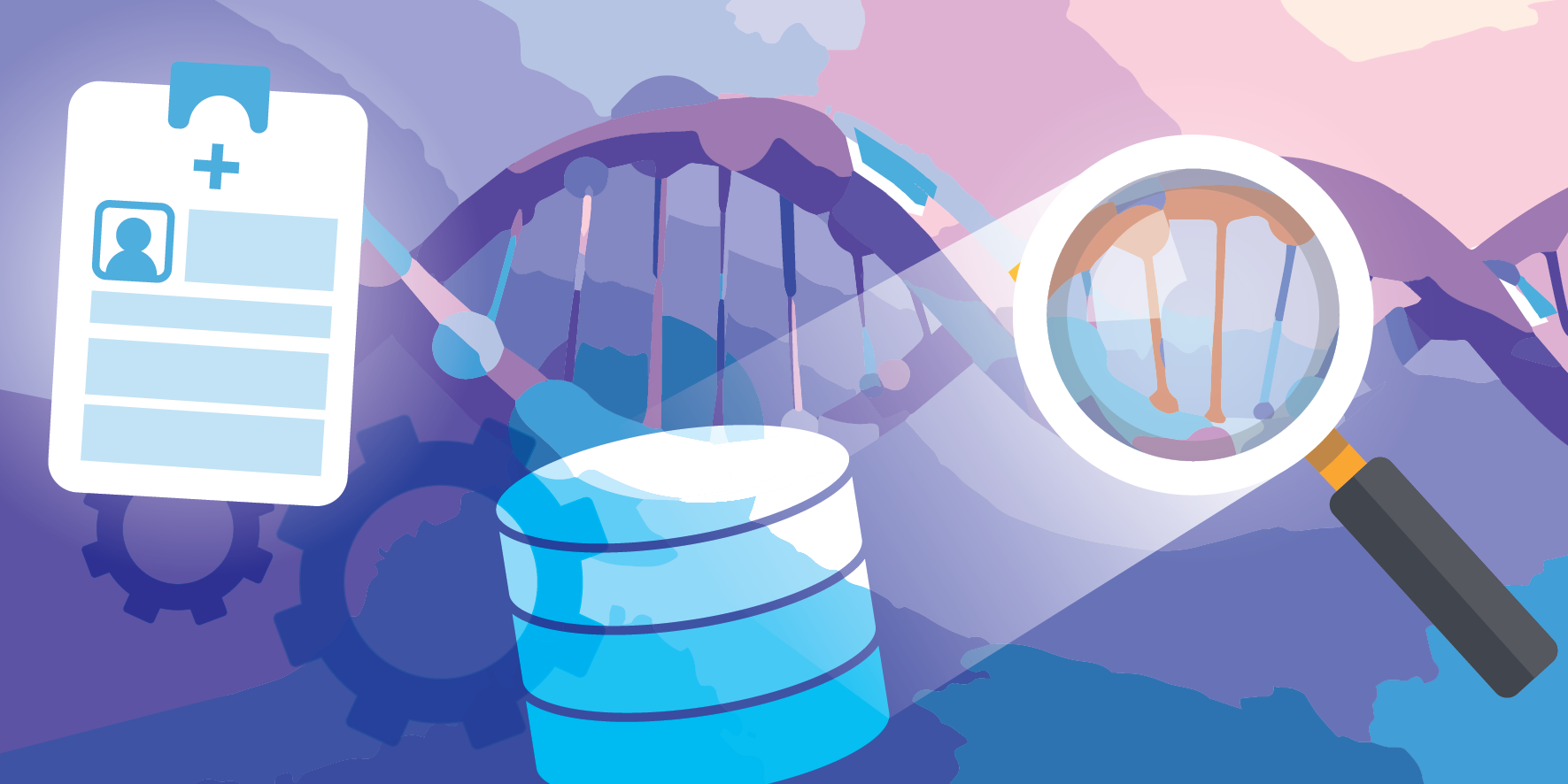About us
Learn how GA4GH helps expand responsible genomic data use to benefit human health.
Learn how GA4GH helps expand responsible genomic data use to benefit human health.
Our Strategic Road Map defines strategies, standards, and policy frameworks to support responsible global use of genomic and related health data.
Discover how a meeting of 50 leaders in genomics and medicine led to an alliance uniting more than 5,000 individuals and organisations to benefit human health.
GA4GH Inc. is a not-for-profit organisation that supports the global GA4GH community.
The GA4GH Council, consisting of the Executive Committee, Strategic Leadership Committee, and Product Steering Committee, guides our collaborative, globe-spanning alliance.
The Funders Forum brings together organisations that offer both financial support and strategic guidance.
The EDI Advisory Group responds to issues raised in the GA4GH community, finding equitable, inclusive ways to build products that benefit diverse groups.
Distributed across a number of Host Institutions, our staff team supports the mission and operations of GA4GH.
Curious who we are? Meet the people and organisations across six continents who make up GA4GH.
More than 500 organisations connected to genomics — in healthcare, research, patient advocacy, industry, and beyond — have signed onto the mission and vision of GA4GH as Organisational Members.
These core Organisational Members are genomic data initiatives that have committed resources to guide GA4GH work and pilot our products.
This subset of Organisational Members whose networks or infrastructure align with GA4GH priorities has made a long-term commitment to engaging with our community.
Local and national organisations assign experts to spend at least 30% of their time building GA4GH products.
Anyone working in genomics and related fields is invited to participate in our inclusive community by creating and using new products.
Wondering what GA4GH does? Learn how we find and overcome challenges to expanding responsible genomic data use for the benefit of human health.
Study Groups define needs. Participants survey the landscape of the genomics and health community and determine whether GA4GH can help.
Work Streams create products. Community members join together to develop technical standards, policy frameworks, and policy tools that overcome hurdles to international genomic data use.
GIF solves problems. Organisations in the forum pilot GA4GH products in real-world situations. Along the way, they troubleshoot products, suggest updates, and flag additional needs.
GIF Projects are community-led initiatives that put GA4GH products into practice in real-world scenarios.
The GIF AMA programme produces events and resources to address implementation questions and challenges.
NIF finds challenges and opportunities in genomics at a global scale. National programmes meet to share best practices, avoid incompatabilities, and help translate genomics into benefits for human health.
Communities of Interest find challenges and opportunities in areas such as rare disease, cancer, and infectious disease. Participants pinpoint real-world problems that would benefit from broad data use.
The Technical Alignment Subcommittee (TASC) supports harmonisation, interoperability, and technical alignment across GA4GH products.
Find out what’s happening with up to the minute meeting schedules for the GA4GH community.
See all our products — always free and open-source. Do you work on cloud genomics, data discovery, user access, data security or regulatory policy and ethics? Need to represent genomic, phenotypic, or clinical data? We’ve got a solution for you.
All GA4GH standards, frameworks, and tools follow the Product Development and Approval Process before being officially adopted.
Learn how other organisations have implemented GA4GH products to solve real-world problems.
Help us transform the future of genomic data use! See how GA4GH can benefit you — whether you’re using our products, writing our standards, subscribing to a newsletter, or more.
Join our community! Explore opportunities to participate in or lead GA4GH activities.
Help create new global standards and frameworks for responsible genomic data use.
Align your organisation with the GA4GH mission and vision.
Want to advance both your career and responsible genomic data sharing at the same time? See our open leadership opportunities.
Join our international team and help us advance genomic data use for the benefit of human health.
Discover current opportunities to engage with GA4GH. Share feedback on our products, apply for volunteer leadership roles, and contribute your expertise to shape the future of genomic data sharing.
Solve real problems by aligning your organisation with the world’s genomics standards. We offer software dvelopers both customisable and out-of-the-box solutions to help you get started.
Learn more about upcoming GA4GH events. See reports and recordings from our past events.
Speak directly to the global genomics and health community while supporting GA4GH strategy.
Be the first to hear about the latest GA4GH products, upcoming meetings, new initiatives, and more.
Questions? We would love to hear from you.
Read news, stories, and insights from the forefront of genomic and clinical data use.
Attend an upcoming GA4GH event, or view meeting reports from past events.
See new projects, updates, and calls for support from the Work Streams.
Read academic papers coauthored by GA4GH contributors.
Listen to our podcast OmicsXchange, featuring discussions from leaders in the world of genomics, health, and data sharing.
Check out our videos, then subscribe to our YouTube channel for more content.
View the latest GA4GH updates, Genomics and Health News, Implementation Notes, GDPR Briefs, and more.
Discover all things GA4GH: explore our news, events, videos, podcasts, announcements, publications, and newsletters.
29 Aug 2024
Melissa Cline, of the University of California, Santa Cruz, and Alex Wagner, of Nationwide Children’s Hospital, have been appointed as the new Co-Leads of the GA4GH Genomic Knowledge Standards (GKS) Work Stream.

By Jaclyn Estrin, GA4GH Science Writer
The Global Alliance for Genomics and Health (GA4GH) is pleased to welcome Melissa Cline of the University of California, Santa Cruz, and Alex Wagner, of Nationwide Children’s Hospital, as the new Co-Leads of the Genomic Knowledge Standards (GKS) Work Stream.
Genomic knowledge originates from the study of an individual’s genome — all the DNA in one’s body — and the accompanying biomedical information inherent within it.
If a patient is suspected to have a genetic disease — one that results from an abnormality in one’s DNA — doctors may study that person’s genome to explore whether genetic differences, also known as variants, are present and a possible cause of the disease.
Because each person possesses nearly five million variants, clinicians have the challenging task of pinpointing the specific variant that might cause the genetic disease. Computer searches are also limited by the absence of a common language to describe variants of clinical importance.
The GKS Work Stream strives to enable communication among computers by developing a standardised language to describe genetic variants and their attributes. This will facilitate the secure search, exchange, and application of genomic knowledge to promote greater understanding of genetic diseases and advance patient care.
Previously under the lead of Robert Freimuth (Mayo Clinic) and Andy Yates (EMBL’s European Bioinformatics Institute), the GKS Work Stream has an active and engaged contributor base driving the standards forward. Cline and Wagner now take the helm and are looking forward to building off the momentum the Work Stream has cultivated to date.
Wagner is a principal investigator at the Steve and Cindy Rasmussen Institute for Genomic Medicine at Nationwide Children’s Hospital. His research interests focus on sharing and harmonising genomic data, particularly in the cancer field. He works to advance precision medicine and garner a greater understanding of genomic cancer variants by standardising their representation and annotation. His first involvement with GA4GH was through engagement with the Variant Interpretation for Cancer Consortium (VICC) Driver Project, which aims to advance precision oncology through a coordinated effort to share standardised information about cancer variants.
Wagner quickly became involved in the GKS Work Stream, where he worked with Reece Hart (MyOme) and Larry Babb (Broad Institute of MIT and Harvard) to drive the Variation Representation Specification (VRS) v1.0 through its first product approval. He is now a Product Lead for VRS, a standardised computational language designed to facilitate reliable and secure exchange of genetic variation information among global institutions, labs, and systems. He also engages in the GA4GH Cancer Community, where knowledge is shared about utilising GA4GH standards to enhance oncology care.
Cline, a longstanding contributor of GA4GH for nearly a decade, has a scientific career focused on genomic data sharing. She has shared her expertise with GA4GH as an active participant of GKS, also supporting the development of VRS. In addition, she previously served as a Product Steering Committee member through her leadership role with the BRCA Challenge, one of GA4GH’s first Driver Projects.
At the University of California, Santa Cruz, Cline is the Program Manager for BRCA Exchange, the primary output of the BRCA Challenge and a global repository of BRCA1 and BRCA2 variants. The BRCA Exchange is designed to enable responsible data sharing to support researchers and health professionals in gaining a deeper understanding of BRCA variants and the genetic roots of breast, ovarian, and pancreatic cancer, along with other diseases.
Wagner and Cline have both expressed their excitement in working with each other and addressing several key priority areas to encourage the continued growth of the Work Stream. Together, they aim to engage stakeholders throughout the GA4GH community in implementing GKS products. By building off of the successful implementations of VRS by a few core Driver Projects, the Co-Leads want to engage a broader set of implementers to advance uptake of all GKS products.
Cline noted a priority of fostering cross-Work-Stream collaboration. “GA4GH has been effective in laying the groundwork for community driven standards,” Cline said. “GA4GH has also been effective at getting a diversity of stakeholders to the table to collaborate together on the definition of those standards.”
“One of my goals is to think about how we can facilitate broader perspectives and engagement in the Work Stream,” Wagner said. In this way, GA4GH can bring together a group of community members to build products that are “transparent, open, consensus-based, and FAIR [Findable, Accessible, Interoperable, and Reusable].”
Another goal is to define clear procedures to operationalise standards development activities. This would involve leveraging the expertise and experience of the active contributor base to formalise lessons learned, outline a process for new participants to carry the work forward, and consider a phased approach to implementation at a larger scale.
Cline emphasised this vision by saying, “I hope to see the point when some of the GKS products are so commonly adopted that the people forget that they’re GA4GH products.” This suggests a future state in which GKS products are so ubiquitous and widely implemented that they take on a life of their own even outside of the sphere of GA4GH.
Wagner agreed, “I am most excited about the potential to get over what have been long-standing challenges in the field through the advancement and adoption of these genomic knowledge standards.”
Cline and Wagner expressed that sharing genomic knowledge requires community-driven standards. The Co-Leads, along with active GKS contributors, are working to enable the genomic knowledge exchange that is key to advancing research, unlocking the potential of precision healthcare, and improving human health outcomes.
